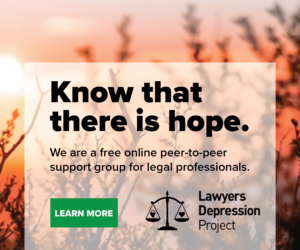[ad_1]
 Ed. note: This post by longtime ATL contributor Brian Cuban is aimed at informing our audience of the invaluable online peer-to-peer support group for legal professionals, The Lawyers Depression Project. Over the coming months, we will continue to highlight and promote LDP as a community service for our audience.
Ed. note: This post by longtime ATL contributor Brian Cuban is aimed at informing our audience of the invaluable online peer-to-peer support group for legal professionals, The Lawyers Depression Project. Over the coming months, we will continue to highlight and promote LDP as a community service for our audience.
The Lawyers Depression Project (LDP) started off with a handful of participants meeting virtually a few times a month to talk about coping with mental health while practicing law. Since then, it has grown into a worldwide community of over 900 members, with weekly peer support meetings and other resources like an online forum for lawyers, legal admin and support staff, and law students to connect with each other.
I was so moved by LDP’s commitment to wellness in the legal profession that I became a member of the LDP Board of Directors. As someone who has long been in the trenches of lawyer mental health and recovery from substance use disorder, I understand the importance of compassionate community and shared life experiences to supporting one’s personal journey with mental health and wellbeing.
Fast forward four years, a global pandemic, and unprecedented uncertainty about the future, LDP has remained committed to reaching those in the legal community who struggle with their mental health, particularly those fearing personal and professional repercussions of getting help. It also continues to be a place for not only those with diagnosed mental health conditions, but also those who are suffering but have not sought formal mental health help.
LDP’s weekly peer support meetings involve candid explorations of health and mental health experiences, impacts on legal practice, and tools for effective management and work-life balance.
Here are some examples of the topics that frequently come up:
- I’m wondering how many other attorneys have told their work they struggle with depression/anxiety and what their experience has been?
- I’d like to ask the group whether knowing what caused/led up to their depression helps or hurts their recovery? If they don’t know, how much is it hurting/helping?
- What are your most important self-care practices? Why it is important to prioritize yourself?
- How has your experience with depression, anxiety, or other mental health issues added value to your life or your work?
- Media and social media impact on our mental health, whether you participate and/or limit your intake.
- Isolation, loneliness, and/or feelings of disconnectedness; how we cope, the challenges and benefits of socializing/connecting, and accessing feelings of connectedness, particularly during the pandemic-related shutdown of offices and shift to remote work.
All of LDP’s services and technology are provided at no cost to members (they have a web forum, chat room, and video conferencing technology for use by members). What’s more is that membership and meetings are confidential, and members have the option of anonymity when they participate.
I am heartened by Above the Law’s recognition of LDP as a direct resource for those across the legal profession. At LDP, job title, firm name, practice area, etc. do not matter. All that matters is that you are part of the legal profession and that you experience mental health challenges.
[ad_2]




